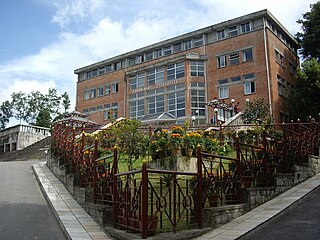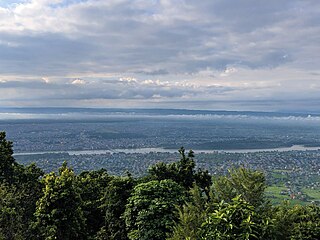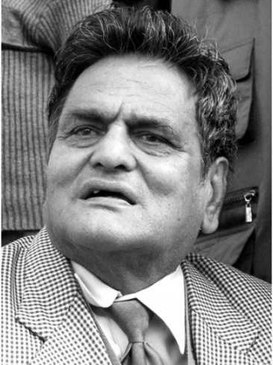Music of Nepal refers to the various musical genres played and listened to in Nepal. With more than fifty ethnic groups in Nepal, the country's music is highly diverse. Genres like Tamang Selo, Chyabrung, Dohori, Adhunik Geet, Bhajan, Filmi music, Ghazal, Classical music, songs and Ratna music are widely played and popular, but many other less common genres are yet to be cataloged. Western musical genres like Rock, Metal, Hip-Hop, Rap, R&B also regularly feature on the Nepalese music charts. Most of the country's musical bands are based in the Kathmandu valley. Musical genres from Tibet and India have greatly influenced Nepalese music.

Tribhuvan University is a public university located in Kirtipur, Kathmandu, Nepal. Established in 1959, TU is the oldest and the largest university in Nepal. It offers 1,000 undergraduate and 500 postgraduate programs across a wide range of disciplines. Additionally, the institution has 62 constituent campuses and over 1,080 affiliated colleges across the country.

Kathmandu University (KU) is a public autonomous university in Nepal. It is the third oldest university in Nepal, located in Dhulikhel of Kavrepalanchok District, about 30 km (19 mi) east of Kathmandu. It was established in 1991 with the motto "Quality Education for Leadership." KU operates through its seven schools, and campuses in Dhulikhel, Patan, Lalitpur and Panchkhal. The university offers undergraduate, graduate and postgraduate courses in a variety of fields.

Shukra Raj ShastriJoshi(Nepali: शुक्रराज शास्त्री जाेशी) was a Nepalese social activist from Newar community, an intellectual and fighter for democracy who was executed by the autocratic Rana dynasty. He is one of the four martyrs of the Nepalese revolution that toppled the Rana regime. The other three are Dashrath Chand, Dharma Bhakta Mathema and Ganga Lal Shrestha.

Bharatpur is a city in south central Nepal. It is the third most populous city of Nepal after Kathmandu and Pokhara with 369,377 inhabitants in 2021. It is also the second largest metropolitan city in Nepal by area. It is the district headquarter of the Chitwan District.

Christianity is, according to the 2021 census, the fifth most practiced religion in Nepal, with 512,313 adherents or 1.8%, up from 2011 when there were 375,699 adherents or 1.4% of the population. Many informed observers have estimated that there are at least 1 million Nepali Christians. According to some Christian groups, there may be as many as 3 million Christians in Nepal, constituting up to 10% of the country's population. A report by Gordon Conwell Theological Seminary identified the Nepali church the fastest growing in the world. The vast majority of Nepali Christians are evangelical Protestants ; there is also a small Catholic population of roughly 10,000.

Mark Turin is a British anthropologist, linguist and occasional radio broadcaster who specializes in the Himalayas and the Pacific Northwest. From 2014–2018, he served as Chair of the First Nations and Endangered Languages Program and Acting Co-Director of the Institute for Critical Indigenous Studies at the University of British Columbia in Vancouver. He is an Associate Professor at the University of British Columbia, cross-appointed between the Department of Anthropology and the Institute for Critical Indigenous Studies. Turin served as Interim Editor of the journal Pacific Affairs from 2023-2024.

The Government of Nepal is the federal executive authority of Nepal. Prior to the abolition of the Nepali monarchy in 2006, it was officially known as His Majesty's Government.
Bahun, also known as Hill Brahmins, are a Brahmin varna among the Khas of Nepal. They are Sub caste of the Kanyakubja Brahmin while their origins are from Kannauj and the Himalayan belt of South Asia. According to the 2011 Nepal census, Bahun is the second most populous group after Chhetri.

Nepal Law Campus, originally called Nepal Law College, is the oldest college under the Faculty of Law of Tribhuvan University - the oldest and largest university of Nepal. Nepal Law Campus was established in 1954 by three professors of Tri-Chandra College under the leadership of Prof. Ram Raj Pant, who also served as its founding Principal. Two others instrumental in the establishment were Prof. Ratna Bahadur Bista and Prof. Ashutosh Ganguli. Initially, the College operated under the affiliation of Patna University of India. Before shifting to its present location at Exhibition Road in Kathmandu, the College operated as evening school at Durbar High School in Rani Pokhari, Kathmandu.
Prof. Ram Raj Pant (1920–1993) was a pioneering linguist of the Nepali language, literary writer and promoter of legal education in Nepal. In addition to publishing multiple volumes on Nepali linguistics, Ram Raj Pant led the establishment of Nepal Law College and was its founding Principal. Nepal Law College later became Nepal Law Campus under the Tribhuvan University.

Tri-Chandra Multiple Campus is a constituent campus of Tribhuvan University located in Ghantaghar, Kathmandu. Founded in 1918 by Chandra Shumsher, it is the oldest institute of higher learning in Nepal.

Dor Bahadur Bista is a Nepalese anthropologist, social scientist and activist. Bista is considered the Father of Nepali anthropology, and has published popular books such as Fatalism and Development and People of Nepal. Bista mysteriously disappeared in 1995.
Khimlal Devkota is a Nepali politician belonging to Communist Party of Nepal and a Senior Advocate. Previously Devkota has served as the party spokesman of the Naya Shakti Party in Nepal.

Yogesh Bhattarai is a Nepali politician currently serving as a member of Parliament in the House of Representatives from Taplejung constituency since 2017. Bhattarai is currently in his second term as secretary of CPN-UML. He has previously also served as Minister of Culture, Tourism and Civil Aviation.
"Melancholy" is an environmentally-themed song sung by 365 Nepali artists. This song was intended to promote an environmental message by breaking the Guinness World Records for "Most Vocal Solos in a Song Recording", which it successfully did. It was written, music composed and directed by environmentalist Nipesh Dhaka. The song was recorded as a single on 19 May 2016. The recording sessions were inaugurated by Prime Minister Khadga Prasad Oli at 8 am and continued until 6 pm. The song was released on 2 September 2017 by President Bidya Devi Bhandari at Army Officer's Club, Kathmandu.

Dance is a performing art form consisting of purposefully selected sequences of human movement. Dance (Nepali: नृत्य/ नाच) in Nepal comprises numerous styles of dances, including folk, ethnic, classical to modern dances. Lakhey is the dance of a demon in the carnival of God. Durbar Square, a historic plaza in Kathmandu, Nepal, facing ancient palaces and adorned by Hindu temples, is always full of eager crowds on the last day of Indra Jatra, the festival celebrating Indra, the Hindu king of heaven. In this divine stage, Lakhe the demon dances among gods and deities relentlessly and carelessly.

Bal Krishna Pokharel (1933–2019) was a Nepalese writer, linguist, historian, and literary critic. He was one of the key person behind the publishing of Nepali Brihat Sabdakosh, a comprehensive Nepali dictionary. Alongside Nepali language, he also wrote in Sanskrit and Magar languages. He wrote multiple fiction, non-fiction and poetry books and was awarded with Madan Puraskar in 1963 for his book Nepali Bhasa Ra Sahitya.
Events in the year 2023 in Nepal.












